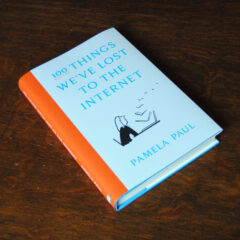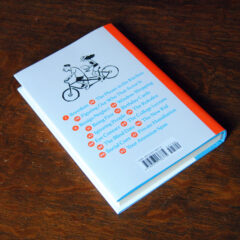
Are there really 100 Things We’ve Lost to the Internet? Yes, there are. And not only has Pamela Paul listed them for us in her book but she’s defined how some of these things were not only formative but even perhaps aspirational to previous generations!
This book is a list book, a gigantic listicle if you will. It is also a history book, a philosophy book, a book full of questions and theories, and a definitive generation divider.
Let’s start with the last one, shall we?
This book divides generations because as you read through the 100 things, you will either find yourself nodding along because you experienced these things or thinking about how you watched these things in some older movie. I, for one, experienced these things.
I am just barely not a Gen Xer or a Gen Xer by definition of age, as a cursed member of that shoulder generation between Gen X and millennial, but regardless I identify as a Gen Xer. This isn’t really of any importance except in how you experience this book. No matter how young you may be and how many of these things were obsolete before you came of a certain age, this book can be read as a treatise of the advancement of technology and what it means for non-technological things.
The Phone Call, The Paper, Passing Notes (physical notes on paper that were folded up), Record Albums – these are just some of the things that you either experienced in the flesh or watched in a coming-of-age movie set in the 1980s. That, my friends, is how this book divides generations. For those of us old enough to remember, reading this book is not only a, “yeah that doesn’t happen any more,” it’s also a trip down memory lane to the last time some of these things happened.

Author Pamela Paul
I remember passing notes. I remember wanting to read “The Paper.” I remember the Phone Call, and my parents still have a phone in the kitchen. But this book isn’t just a trip down memory lane or an insight for millennials into what the “before times” were like when your phone was tethered to the wall and not a supercomputer in your pocket.
This book is also an examination into what we lost as we lost these things. Sick Days are no longer a thing because your office is wherever you may have internet access. Private humiliation is gone, because we’re always on display as the internet records our humiliation and shares them on TikTok or Reddit. Boredom is no longer a thing because “tuning out no longer means spacing out; it means tuning in to something else.”
This book was a fun read. It was all of the things I have described and more, but it was a unique reading experience. I thoroughly enjoy sitting down and reading a book for a lengthy period, but this book requires a little more patience. It’s not that every single one of the 100 things will hit you with a thoughtful remembrance yourself, but occasionally they will hit you harder than you expected. At least that’s been my experience.
As the book reminds you of the time you took handwritten notes and folded them up into the tightest smallest little square you could conceive, your mind wanders back to that time. When Paul laments, “We’re running out of bookish boys to grow into bookish men (and they are missed),” I think, here I am reading this book considering myself a bookish man!

All of these things made me stop reading, not in a bad way, but in a good way. It engaged my experience and my memory, my fondness for what was, my sometimes disdain for what is, and my hope for what might be.
While your memories and experience may differ from mine, I expect that you will enjoy this book as much as I did. In your own time, perhaps even before bed, you might find yourself thinking about something that Paul has written, that has sparked in you a memory. This book is comprehensive and contemplative, and for all those reasons and more, this book is for everyone.
Read the Secret File of technical information and quotes from 100 Things We’ve Lost to the Internet.